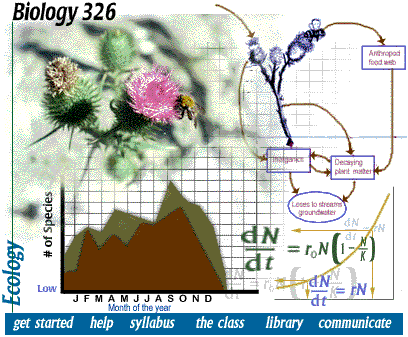

BIO326: Ecology - Introduction to ecological principles, including the distribution and abundance of organisms, population dynamics, community organization, energy flow, and nutrient cycling. 3 hrs credit. One year of introductory biology is a prerequisite.
As the human population grows larger and technology provides ever more intrusive ways to affect our environment, understanding ecological principles becomes increasingly important for environmental management, species conservation, and even the quality of our lives. It also provides a basis for critical decisions, like how to vote when you have the opportunity.
We will take a look at ecology from the standpoint of the individual organism, through the ways that organisms make up populations, how those populations affect each other and build communities, and finally the ecological systems that we see in nature. We will examine ecology in the following five modules. In this class, we will take them in the following order.
For a textbook, we will use the fourth edition of The Economy of Nature by Robert E. Ricklefs (ISBN 0-7167-2815-X). It is published by W. H. Freeman & Company. The textbook will be available from the Northern Arizona University Bookstore, which you may obtain in person or by order.
This course runs during the fall 1999 semester at Northern Arizona University (course sequence number is 97002). The course begins on 30-Aug-1999 and ends on 10-Dec-1999. We will work on each subject area for 3 weeks, not counting a few days for NAU's Thanksgiving break in November (25-26). (For spring 2000, the course sequence number is 87050, and it will run from 18-Jan-2000 to 5-May-2000.)
Enroll in BIO 326.
Then click one of the links above to read the Communication page, view additional resources from Cline Library, or get technical help.
E-mail Professor Gaud William.Gaud@nau.edu, or call (520)523-7516
 Copyright 1999 Northern Arizona University
Copyright 1999 Northern Arizona University